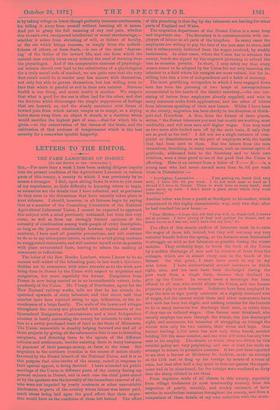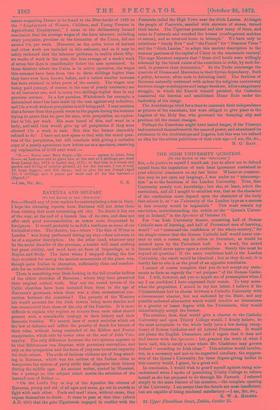LETTERS TO THE EDITOR.
THE FARM LABOURERS OF DORSET.
[TO THE EDITOR OF THE " SPROTATOR.1
SIR,—For more than a week I have been making diligent inquiry into the present condition of the Agricultural Labourer in various parts of this county, a county to which I was previously by no means a stranger. I find, upon sitting down to write to you some -of my experiences, no little difficulty in knowing where to begin, eo numerous are the details that I have collected, and so pertinent 'do they seem to the discussions that have recently taken place in your columns. I should, however, in all fairness begin by saying 'that as a member of the Consulting Committee of the National Agricultural Labourers' Union, I cannot be expected to approach this subject with a mind previously unbiassed, but from this very cause, as well as from my strongly formed opinions of the necessity of combination among work-people of every description, so long as the present relationships between capital and labour continue, I have used all possible precautions, and will continue to do so in my subsequent letters, in order to avoid giving credence -to exaggerated statements, and will content myself as far as possible with plain unvarnished facts, leaving to others the making of comments or reflections.
The letter of the Rev. Brooke Lambert, whom I know to be an earnest well-wisher of the labouring poor, in last week's Spectator, -decides me to commence with some remarks as to the work now -being done in Dorset by the Union with respect to migration and -emigration, but more especially the former. Emigration from Dorset is now being carried on to no inconsiderable extent, inde- 'pendently of the Union. Mr. Vicary, of Dorchester, agent for the New Zealand railway works, tells me that he has already de- -spatched upwards of sixty labourers, and that about half that namber have been rejected owing to age, infirmities, or the in- -cumbrance of a large family. The walls of the towns and villages throughout the county are placarded with advertisements of the Queensland Emigration Commissioners, and a local Independent minister is busily canvassing the county for colonists to take with him to a newly-purchased tract of land in the State of Minnesota. 'The Union meanwhile is steadily helping forward one and all of these projects by giving-all the information that it can to intending -emigrants, and directing them to the agents of the different 'colonies and settlements, besides assisting them in many instances in payment of their passage-money, or fares to the coast. But migration to the northern counties is the course of action chiefly 'favoured by the Dorset branch of the National Union, and it is to this purpose that nine-tenths of the money, raised in response to their special appeal, is being devoted. I have attended six public -meetings of the Union in different parts of the county during my present sojourn in Dorset, and in each case the chief point aimed -at by the speakers was the necessity of the immediate removal of all, -who were not impeded by yearly contracts or other unavoidable hindrances, to parts of the country where labour was better paid, much stress being laid upon the good effect that their migra- tion would have on the condition of those left behind. The effect
of this preaching is that day by day labourers are leaving for other parts of England and Wales.
The migration department of the Dorset Union is a most busy and important one. The Secretary is in communication with em- ployers of labour in all parts of the kingdom. In many cases the employers are willing to pay the fare of the men sent to them, and this is subsequently deducted from the wages received, by weekly instalments. In other cases, where the Union has to advance the money, bonds are signed by the migrator promising to refund the loan as occasion permits. In short, I may safely say that every means seems to be adopted by the Union for not only removing the labourer to a field where his energies are more valued, but for in- stilling into him a love of independence and a habit of economy.
The most gratifying occupation in which I have engaged down here has been the perusing of two heaps of correspondence accumulated in the hands of the district secretary,—the one con- sisting of letters from employers already supplied, and who in many instances make fresh applications, and the other of letters from labourers speaking of their new homes. Whilst I have been
in the county, migration has been chiefly in the direction of Stock- port and Holmfirth. A firm, from the former of these places, writes, "the Dorset labourers you sent last month are working moat creditably, and will soon earn still higher wages. You may send us two more able-bodied men off by the next train, if only they are as good as the last." I did not see a single instance of com- plaint or dissatisfaction on the part of employers with tho hands that had been sent to them. But the letters from the men themselves, breathing, in many instances, such an earnest spirit of gratitude, addressed both to the Secretary and to their own relatives, were a clear proof to me of the good that the Union is
effecting. Here is an extract from a letter of T— E---'s, a
young man who had never earned more than 8s. 6d. per week when in Dorsetahire :— "Accrington, Lancashire I am getting on, thank God, very well; I have 22s. 6d. per week. I do not work near so hard as I should if I were in Dorset. There is work here on every hand ; send some more up here. I don't know a place about where they work Saturdays."
Another letter was from a youth at Stockport to his mother, which commenced in this highly characteristic way, only two days after he had reached his new home :—
$4 Dear Mother,—I hope this will find you well, as, thank God, it leaves me at present. I have plenty of beef and puddon for dinner, and as much bacon as lean eat, and I have lost my box," Ice.
The effect of this steady outflow of labourers must be to raise the wages of those left behind, but they will not reap any very material benefit before the spring, as the farmers seem determined to struggle on with as few labourers as possible during the winter
months. They evidently hope to break the back of the Union by a sudden discharge of men and by eviction of them from the cottages, which are in almost every case in the bands of the farmer. On this point, I shall have much to say in my next letter. I have authenticated several instances in which
eight, nine, and ten men have been discharged during the past week from a single farm, because they declined to give up the Union. In several cases a sovereign has been offered to all men who would abjure the Union, and one farmer promises a pig to each deserter. Solicitors have been employed to urge the men to sign yearly contracts at a slightly increased rate of wages, but the success which these and other manceuvrea have met with has been but slight, and nothing remains for the farmers to do in many instances but discharge their men, or retain them if they can on reduced wages. One farmer near Stickland, who usually employs ten men through the winter, has just discharged eight, and announces his intention of struggling on through the
winter with only his two carters, their wives and boys. One farmer holding 1,000 acres has now only three hands, another holding 700 the same number, and one with 500 acres has only two men in his employ. The straits to which they are driven by this suicidal policy are very perplexing, and one at least has made an attempt to return to primitive customs. It has just been reported to me that a farmer at Milburne St. Andrew, made an attempt on the 12th inst. to drag up his turnips by means of a team of oxen, but that after half a day spent in this occupation the experi-
ment had to be abandoned, for the turnips were rendered so dirty that the sheep refused to eat them.
From inquiries made of all classes in this county, especially from village tradesmen (a most trustworthy source), from the inspection of yearly, monthly, and weekly contracts of farm service in numberless instances throughout the county, and from a comparison of these details of my own collection with the state-
manta respecting Dorset to be found in the Blue-books of 1869 on the "Employment of Women, Children, and Young Persons in Agricultural Employment," I come to the deliberately formed conclusion that the average wages of the farm labourer, including every perquisite, previous to the formation of the Union, did not exceed 10s. per week. Moreover, as the extra hours of harvest and other work are included in this estimate, and as it may be safely reckoned that the labourer performs in reality shoat fifty- six weeks of work in the year, the true average of a week's work of seven fair days is considerably below the sum mentioned. In those districts where the Union is in active operation, the wages this summer have been from two to three shillings higher than they have ever been known before, and a rather smaller increase has been attained in other parts of the county. The wages now being paid (except, of course, in the case of yearly contracts) are in all instances one, and in many two shillings higher than in any previous autumn. In a few parishes, Wlaitchurch for example, a determined stand has been made by the men against any reduction, and 12s. a week without perquisites is still being paid. I may mention that a farmer from this parish wrote to the papers during the summer trying to prove that he gave his men, with perquisites, an equiva- lent to 16s. per week. His men heard of this, and went in a body, and said they would give up all perquisites if they were allowed 12s. a week in cash. But this the farmer staunchly refused to do! I have not now space to deal with the vexed ques- tion of the perquisites, but will conclude with giving a verbatim copy of a yearly agreement now before me as a specimen, reserving my explanation of it till next week :- "R— Farm, near Bore Regis.—Mr. -- agrees to hiere John G— as Labourer and to glove him at the rate of 8 shillings per week from Ladey day, 1872, to Ladey day, 1873; to find him in a house and garden and 20 lug of potatoe ground, .61 for the harvest, 1 ton of coal, 50 large faggots, and 200 furze ; and to give his son Joseph (aged 18) 6 shillings and C pence per week and £1 for the harvest.— (Signed.)"



































 Previous page
Previous page